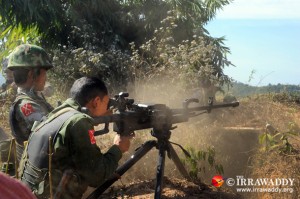12-18 August: Whose Guns Are Silent?
August 19, 2013 As President Thein Sein once again claimed success in the peace process, the United Nations Special Rapporteur on the situation of human rights in Burma, Tomás Ojea Quintana, was denied permission to visit the active warzone in Kachin State, illustrating the gap between words and reality.
As President Thein Sein once again claimed success in the peace process, the United Nations Special Rapporteur on the situation of human rights in Burma, Tomás Ojea Quintana, was denied permission to visit the active warzone in Kachin State, illustrating the gap between words and reality.
In President Thein Sein’s address for swearing in new deputy ministers on 15 August, he stated that “the guns have gone silent,” echoing his remarks on his visit to the UK in July where he asserted that “very possibly, over the coming weeks, we will have a nationwide ceasefire and the guns will go silent everywhere in Myanmar for the first time in more than 60 years.” The reality is that the guns of the Burma Army are far from silent, and the ethnic people, particularly in Kachin State and northern Shan State, are suffering more under Thein Sein than the previous military regime headed by Than Shwe.
In Kachin State, despite an agreement signed at the end of May with the Kachin Independence Organization (KIO), the Burma Army continues to advance, reinforce and resupply positions in northern Shan State. Civilians are being arrested and tortured while the Burma Army secures confiscated lands for crony investment, particularly in mining areas rich in precious stones. It is of no surprise that continued attacks on KIO positions are in areas close to the recently operational Shwe Gas Pipeline, a joint venture between the military company, Myanmar Oil and Gas Enterprise (MOGE) and a consortium of Indian and South Korean companies to transport gas through Burma and sell to China. Increased militarization and subsequent human rights abuses around the pipeline by the Burma Army have been common procedure throughout this project.
In other parts of Shan State, armed clashes between the Burma Army and the Shan State Army – North and Shan State Army – South are frequent, despite signing ceasefires with both groups last year. One such instance includes the shelling of a Buddhist temple by the Burma Army just two months ago.
While the worst of the conflict is occurring in Kachin State and northern Shan State, clashes also continue sporadically in other ethnic areas. In Karen State, the Burma Army and its ancillary, Border Guard Force (BGF), attacked the Democratic Karen Benevolent Army (DKBA). This was at the DKBA’s base near the site of the yet to be constructed Hat Gyi Dam, a joint venture between Thailand and the Burma government that will fill the coffers of the central government with little compensation distributed to the areas affected by the project’s negative environmental and social impacts. In July, the Burma Army raided a New Mon State Army (NMSP) base with seven killed in the clash. Increased activity such as resupplying and reinforcing near NMSP positions, and intimidating the local population, is increasing tension despite a ceasefire.
These clashes indicate not just the fragility of the current ceasefire agreements but also the lack of political will from the Burma government to work towards sustainable peace agreements. By visiting Laiza, the base of the KIO, home town of 20,000 civilians and now 15,000 Internally Displaced Persons (IDPs), the Special Rapporteur would have been able to witness the full effects of the Burma Army offensive that has been ongoing for over 2 years. As Khon Ja, coordinator of the Kachin Peace Network pointed out, “Quintana would be able to witness burned-down villages on his way to Laiza. That’s why he wasn’t allowed to go there.”
Yet a solution can be found. Earlier in August, over 130 delegates from ethnic political parties, civil society organizations and armed groups attended a three-day conference on the peace process organized by the United Nationalities Federal Council (UNFC), an alliance of most of the major ethnic armed groups. The result of this conference was a sustainable solution to the civil war in Burma; revoking the illegitimate 2008 Constitution and replacing it with a genuine federal system governed by democratic politics.
For ethnic communities who have long suffered from the violence unleashed on them by the Burma Army, there needs to be concrete moves towards a political solution to the conflict. They need a system that protects their rights and their identity, of which the current political system does not. Thein Sein’s proclamation that the guns have gone silent may appease some in the international community yet there are many who continue to run in fear from those very guns that are used to chase them out of their homes. The international community, therefore, must pressure the Burma government to engage in a genuine political dialogue to find a solution that not only protects ethnic communities, but allows them to exercise their fundamental rights in freedom and security.
News Highlights
Inside Burma
Burma Army MP interrupts parliamentary discussion on land confiscations by the military
Regional
International
UN Special Rapporteur on human rights Tomás Ojea Quintana visits Arakan State and is greeted by Arakanese protesters
The Nippon Foundation provides US$11 million to build schools in Shan and Arakan States
Opinion
Where is the ASEAN Community?
By Eva Kusuma Sundari
The Jakarta Post
Burma’s Paradox of Plenty
By Hanna Hindstrom
Open Democracy
Latest from the Blog
The Fallen Heroes and Heroines of 8888 Must Be Honored With Accountability
By Burma Partnership
Actions
Statements and Press Releases
U.S. Government Must Ensure U.S. Investors Abide by Reporting Requirements
By 27 organizations
Burma: Letter to President Obama on Reporting Requirements
By 27 organizations
The Women’s League of Burma Condemns the Violent Handling and Arrest of Peaceful Women Activists in Monywa
By Women’s League of Burma
This post is in: Weekly Highlights









 All posts
All posts